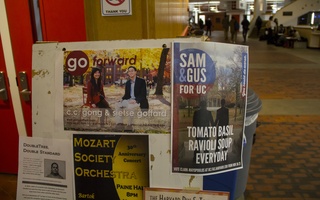UPDATED: November 22, 2013, at 4:42 a.m.
After winning the Undergraduate Council presidential election with a plurality of votes on Thursday night, Samuel B. Clark ’15 and Gus A. Mayopoulos ’15 said they will resign from their positions immediately after they are instated as UC president and vice president, respectively.
The UC Election Commission announced late Thursday night that Clark and Mayopoulos–the joke ticket–won with 1,375 votes out of 3,181 votes cast, 155 more than C.C. Gong ’15 and Sietse K. Goffard ’15. Chika-Dike O. Nwokike ’15 and Una Kim ’15 came in third with 586 votes.
In a statement to the UC Election Commission provided to The Crimson, Clark and Mayopoulos confirmed that they will not serve as UC president and vice president.
"We technically can't yet, but as soon as we can, we hereby resign the offices of President and Vice-President of the Harvard Undergraduate Council," the statement read.
The candidates' statement closed with the line, "LONG LIVE DEAN EVELYNN HAMMONDS."
The resignation of both a UC president and vice president simultaneously is unprecedented in recent UC history. The last time a president or vice president resigned was in 2005, when UC Vice President Ian W. Nichols ’06 resigned halfway through his term.
In an email sent to two UC list-servs after Clark and Mayopoulos’s announcement, UC President Tara Raghuveer ’14 wrote that the Council will proceed with inauguration plans for Dec. 8. If either Clark or Mayopoulos refuse to be inaugurated or they are inaugurated and immediately resign, Raghuveer wrote that the UC will vote on the president and vice president positions in the same meeting, pursuant to Section 42.1 of the Council Bylaws.
Shortly after results were announced, both Gong and Nwokike said in interviews with The Crimson that the vote for Clark and Mayopoulos is going to be “a wake up call” for the UC.
“It really shows a lack of confidence with the Council and our efforts, and I really wish that wasn’t the case because we do do everything for the students,” Nwokike said.
Turnout in the election decreased by more than 400 votes from last year’s election, with 3,181 undergraduates, or almost 47 percent of the student body, casting a ballot.
CHANGING THE VOTE COUNTING METHOD
Though traditionally the UC election has been conducted under the Hare-Clark voting system, in which students have been able to cast a ballot preferentially ranking all of the tickets, an inadvertent error by the UC Election Commission disallowed that option in violation of election rules. As a result, the Commission and all three tickets agreed to switch the counting system from the Hare-Clark voting system to a plurality system, given that the error was not caught until Monday night after voting had already begun.
Under the Hare-Clark voting system, if the number of first-place votes for a single ticket does not constitute a majority, then the ticket with the fewest number of first-place votes is dropped, and its votes are reapportioned to the remaining candidates based on second choices of those who ranked them first. Votes are transferred accordingly until a ticket emerges with a majority of total votes. Under the plurality system, however, the ticket with the most votes automatically wins.
Given the close margin of victory in this year’s election, it is mathematically possible that the outcome of the election could have been different had the Election Commission allowed voters to rank multiple preferences.
Read more in News
50 Years Ago, Cambridge Mourned a 'Son of Harvard'Recommended Articles
-
 Shit Harvard Students Say
Shit Harvard Students Say -
The High TableCAMBRIDGE, United Kingdom—At the back of the dining hall of Trinity College, Cambridge (we just call it “hall,” with no article—as in, “I’m going to hall for dinner!”) there’s a raised platform. Unlike the raised part of Quincy dining hall, the tables on this platform face the rest of the tables in the dining hall at a right angle.
-
 UC Announces Presidential Tickets
UC Announces Presidential Tickets -
 From a New Academic Degree to Dining Hall Soup, UC Presidential Tickets Align and Diverge
From a New Academic Degree to Dining Hall Soup, UC Presidential Tickets Align and Diverge -
Gong and Goffard for U.C.While neither vision inspires us, Gong and Goffard impress us with their concrete experience and their earnest desire to unify and represent students.
-
 Gong and Goffard Seek To 'Go Forward'
Gong and Goffard Seek To 'Go Forward'














